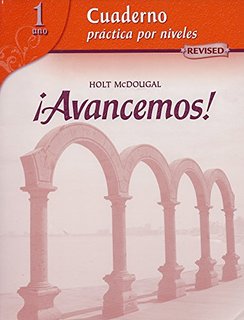
All Solutions
Page 285: Leer C
She also used modal verb or verbs phrases you are probably familiar with; phrases like *”ir a” (to go to)*, *reflexive pronoun + doler (to hurt)*, and *poder (can).*
**Tip:** Always answer in the same tense the question was asked.
– Claudia no **va** a la escuela porque le duele mucho la cabeza.
(Claudia does not go to school because her head hurts a lot.)
The question was asked in the resent tense and we answered in the present tense.
**”Va”** is the third-person singular form of the verb *ir (to go).*
– Claudia **buscó** un libro para su mamá.
(Claudia searched for a book for her mom.)
This time, the question was asked in the preterite, so we answered in the preterite.
**”Buscó”** is the third-person singular form of the verb *buscar (to search).*
– A Claudia le **aydó** su papá. Él **cocinó** unos huevos.
(Claudia’s dad helped her. He cooked some eggs.)
Again, the question was asked in the preterite, so we answered in the preterite.
**”Aydó”** is the third-person singular form of the verb *aydar (to help).*
**”Cocinó”** is the third-person singular form of the verb *cocinar (to cook).*
– Susana **llevó** la tarea a la casa de Claudia en la tarde porque Claudia no **vino** a la escuela.
(Susana brought the homework to Claudia’s house because Claudia did not come to school.)
Again, the question was asked in the preterite, so we answered in the preterite.
**”Llevó”** is the third-person singular form of the verb *llevar (to bring).*
**”Vino”** is the third-person singular form of the verb *venir (to come).*
It would be best if you described what you did at home when you were sick and did not go to school.
(A few days ago, I did not come to school because my stomach hurt.)
The words that are bolded are the preterite forms of the verbs ***venir** (to come)* and a reflexive verb ***doler** (to hurt).*
Because ***doler*** is used as a reflexive verb, its form in the preterite is the same for all persons and numbers; the only thing that changes is the reflexive pronoun which indicates the person and number.
(I talked to m friends from class and they told me what they did at school that day.)
**”Hablé”** is the preterite form for first-person singular of the verb *hablar (to talk).*
**”Dijeron”** is the preterite form for the third-person plural of the verb *decir (to say/to tell).*
**”Hacieron”** is the preterite form for the third-person plural of the verb *hacer (to do).*
(At home, I cooked nutritious food and rested well.)
**”Cociné”** is the preterite form for first-person singular of the verb *cocinar (to cook).*
**”Descansé”** is the preterite form for first-person singular of the verb *descansar (to rest).*

